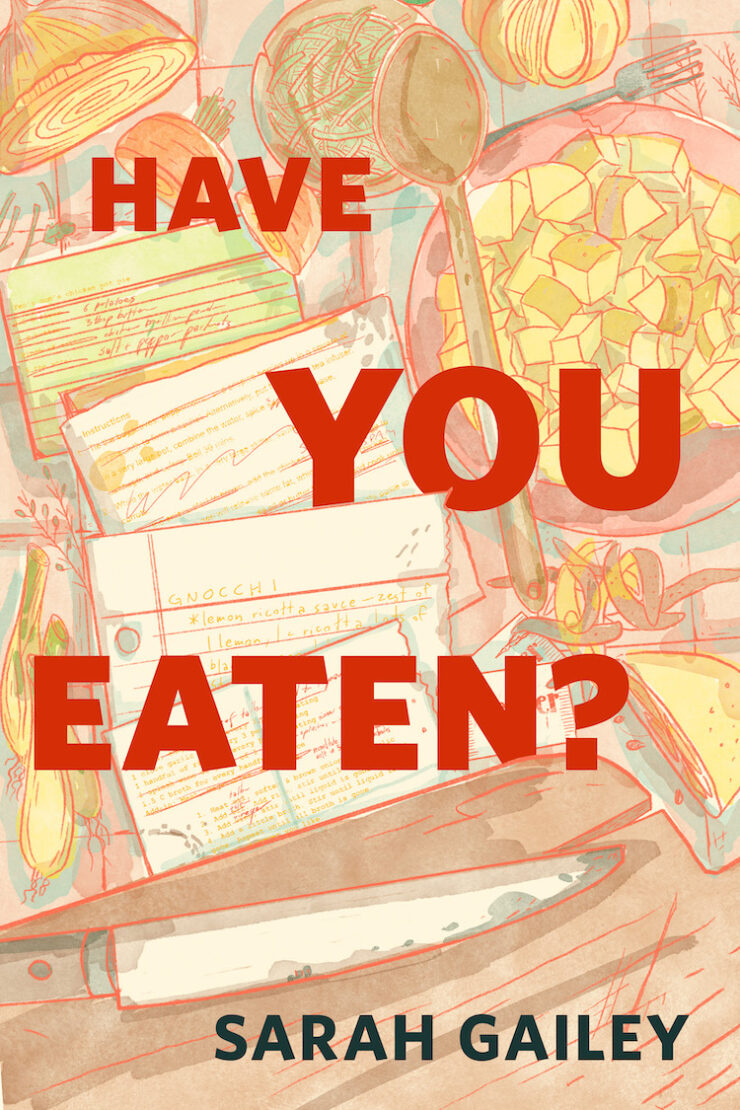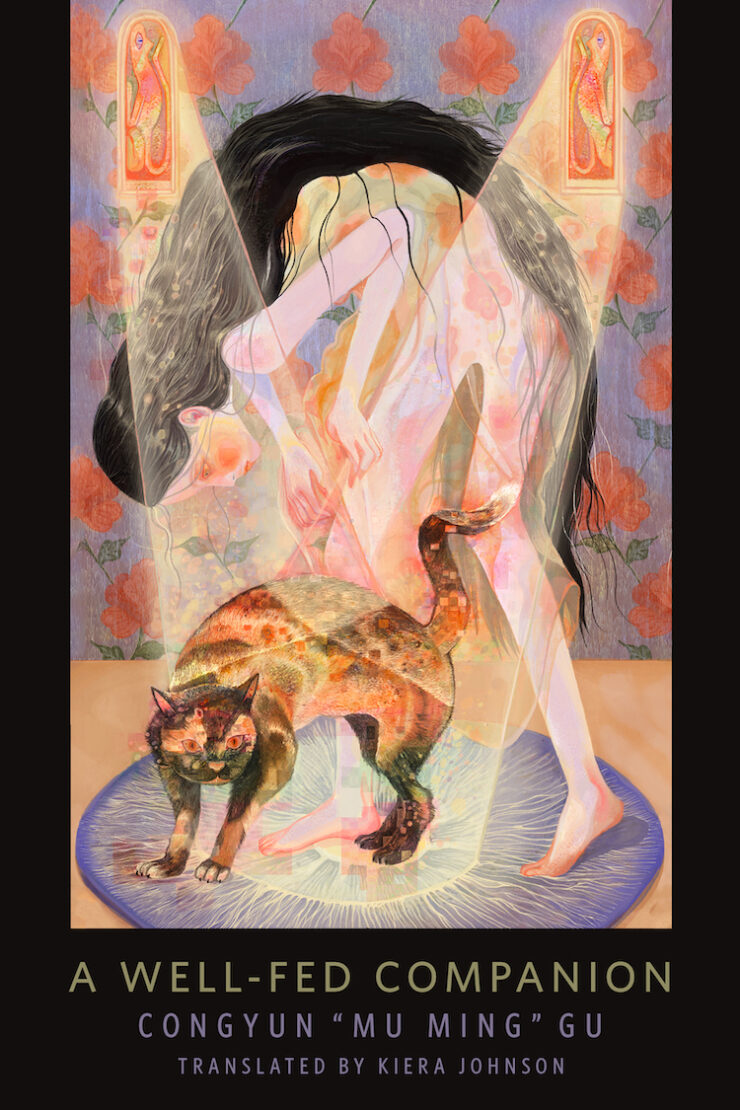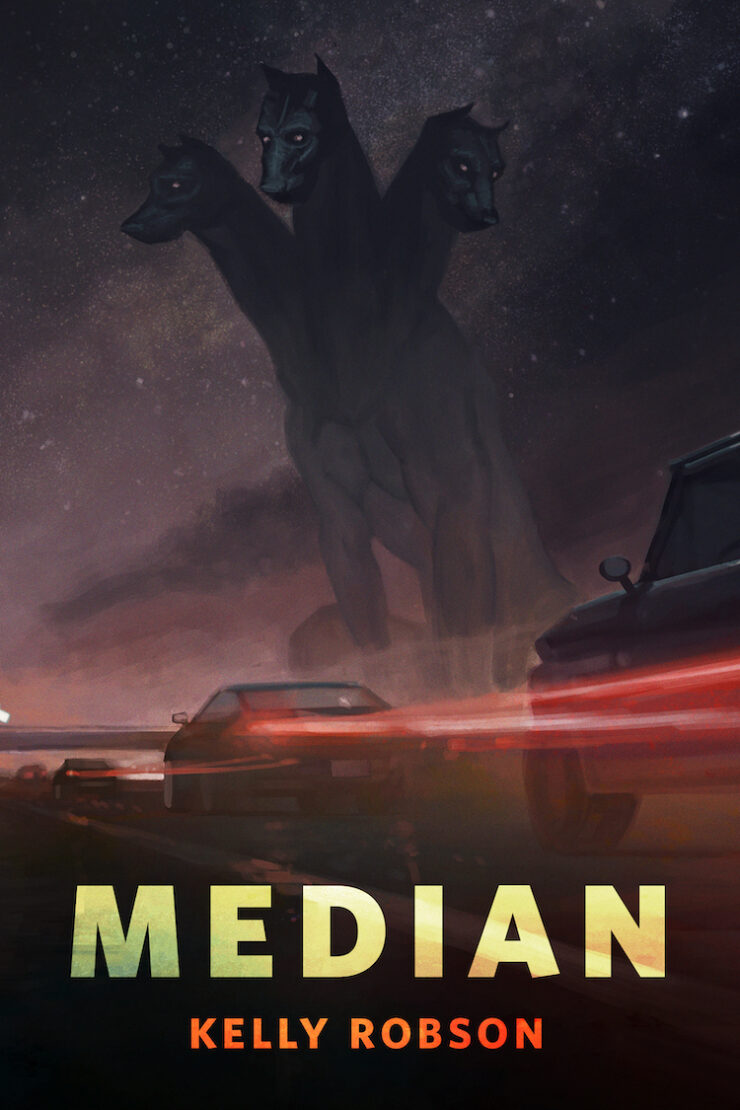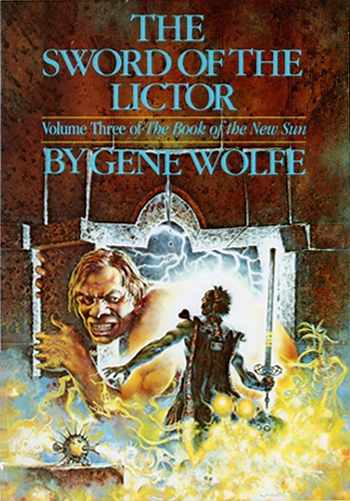With the previous installment of this reread, we’ve approached the halfway point of Gene Wolfe’s masterwork, The Book of the New Sun. (I’m referring, naturally, to the four volumes that comprise this story. The fifth, The Urth of the New Sun, is a coda, and it will be considered as such for the purposes of this rereading.)
The Sword of the Lictor begins with an epigraph by Russian poet Osip Mandelstam: “Into the distance disappear the/mounds of human heads. /I dwindle – go unnoticed now./But in affectionate books, in children’s games,/I will rise from the dead to say: the sun!”
It’s a beautiful elegy, and not very hard to interpret in the context of the saga: the poet is Severian, in his incarnation as Autarch, describing in a nutshell his trajectory, disappearing into the wilds of Urth until he rises again as the New Sun. But how is this transformation accomplished? The third volume gets us closer to the answer.
The shortest book in the series (only 200 pages in the Kindle edition), The Sword of the Lictor begins with Severian and Dorcas together in a room in the city of Thrax, where he will finally take up his position as Lictor. Dorcas complains that people there calls him names like “the black butcher,” and also talk about her. Severian tells her that this opprobrium is the burden of his guild, and that’s why he is forbidden to take a wife, but that he would be glad to break the rules if she wanted him to. She is reluctant, at least in part because she now possesses the full awareness of what he does in his role as lictor and how he has been making his living since they arrived in Thrax:
“Don’t I look the same now?”
“Yes,” she said reluctantly. “But I have been down below. I’ve seen people chained in the tunnels. When we sleep tonight, you and I in our soft bed, we will be sleeping on top of them.”
There are about sixteen hundred prisoners there, and “it’s like a mass grave,” as Dorcas reflects sadly.
Severian then starts to describe the city of Thrax, as well as the prison where he now works as torturer and executioner. He ponders things like the ideal location for a prison and possible ways of escaping such a place. Then he proceeds to describe the Vincula of Thrax, or the house of chains. It’s an ancient place, and Severian says that, for him, this place always appeared to have been intended to serve as a prison from the very beginning, but legend has it that it was originally a tomb, converted to its new purpose hundreds of years before.
To an external observer located on the east bank of the river Acis, the Vincula has the shape of a rectangular bartizan (or turret) jutting from the rock, reaching up four stories high. This visible portion of the structure, however, is but the smallest and least important part, containing (when Severian works as a lictor there) only their administrative offices, a barracks for the clavigers (the guards), and his own living quarters.
The prisioners were held elsewhere, in a slanted shaft bored into the rock, and its description is stark and impressive:
This shaft was about five hundred paces long, and had over a thousand positions for prisoners. Its water supply came from a cistern sunk into the stone at the top of the cliff, and sanitary wastes were disposed of by flushing the shaft whenever this cistern threatened to overflow.
Aside from that shaft (which reminded me of Dante and his description of the City of Dis, which contains the sixth circle of Hell within its steep walls, with the circles of Lower Hell below), the Vincula has much more to offer:
…a confusion of branching galleries and parallel shafts resulting from past attempts to free prisoners by tunneling from one or another of the private residences in the cliff face, and from countermines excavated to frustrate such attempts—all now pressed into service to provide additional accommodations.
Severian also describes the measures he’s undertaken in order to make his work more efficient, such as starting a program of closing unwanted and unnecessary passages, using prisoners to fill said passages with “a mixture of river stones, sand, water, burned lime, and gravel, and to start widening and uniting those passages that remained in such a way as to eventually achieve a rational structure.”
During his first few weeks, while he fulfilled his duties as lictor, Dorcas explored the city of Thrax, and Severian gave her the mission of inquiring after the Pelerines, hoping to locate them so that he can return the Claw of the Conciliator to its rightful guardians. He now carries the Claw in a small sack of doeskin Dorcas sewed for him, for he has found that he cannot sleep unless he has it with him all the time.
But all is not well in his relationship with Dorcas. Severian muses that while they were traveling together, they coexisted as equals and companions; but now that they were living under a roof in a city, things have changed. Dorcas lives as his paramour, and her counsel has become useless because his problems now were of a legal and administrative nature. Severian has forsaken the call to adventure. The Hero’s Journey is not for him anymore—and this is already taking its toll on their love.
Following the unhappy discussion mentioned above, Dorcas cuts her hair very shortly, “until she almost seemed a boy,” and leaves the bartizan. After finishing up his bureaucratic work, Severian disguises himself, borrowing a layman’s jelab from the sergeant of his clavigers and goes out, hoping to find her. After what seems a long while examining the full diversity of humans in the city of Thrax, Severian finally finds Dorcas at the wharf, sitting at the edge of the river with her face in her hands.
He takes her not to their quarters, but to the Duck’s Nest, a cozy inn. And, out of love for her, tries to make the case for his guild:
We are not cruel. We take no delight in what we do, except in doing it well, which means doing it quickly and doing neither more nor less than the law instructs us. We obey the judges, who hold their offices because the people consent to it. Some individuals tell us we should do nothing of what we do, and that no one should do it. (…) There may be justice in that, but it is a justice that would destroy the whole Commonwealth. No one could feel safe and no one could be safe, and in the end the people would rise up—at first against the thieves and the murderers, and then against anyone who offended the popular ideas of propriety, and at last against mere strangers and outcasts.
And, after this homily (we would do good to remember that we are watching a kind of mass, in the Catholic sense of the word), he concludes:
“All right, we are devils,” I said. “If you would have it so. But we are necessary. Even the powers of Heaven find it necessary to employ devils.”
Severian is defending his office as a force for good, and he truly believes that, even if in his heart he also yearns for Vodalus, who opposes everything he stands for.
He leaves Dorcas at the inn, believing that it’s for the best, since staying at the Vincula is serving only to make her feel more and more depressed; taking a narrow street instead of retracing their steps. After half a watch (a unit of time that, according to what Wolfe says in Castle of Days, a twentieth of an Urth day, and, according to Michael Andre-Driussi in Lexicon Urthus, an hour and twelve minutes), however, the street ends against a precipice, near a miserable jacal (a hut) of mud and sticks. Suddenly a child exits the poor house—a very dirty small boy with one eye swollen shut by some infection, weeping tears of pus.
The boy asks for some money and tells Severian his sister is very ill. Immediately, a man appears wearing the apron of a mason, and Severian asks him if he is the owner of that place. The man doesn’t answer, and Severian looks at him, thinking he is a brute with barely enough intelligence to speak properly to him (this theme of brutes and people who are barely human haunts Wolfe’s work, as I’ve mentioned every now and then throughout this reread). The boy urges Severian to see his sister, which he does. The girl is lying upon a heap of straw, and she is a vision of horror:
Her face was a death’s head over which was stretched skin as thin and translucent as the head of a drum. Her lips could no longer cover her teeth even in sleep, and under the scythe of fever, her hair had fallen away until only wisps remained.
Then Severian thinks of the Claw and its apparent healing powers, but he has not attempted to use if since it failed to save Jolenta (some time ago for him, though not for us, at least in this rereading—in terms of the original publication, The Sword of the Lictor was published approximately a year after The Claw of the Conciliator). Now he finds himself afraid to try it again. He ends up doing nothing, finding it hard to breathe, and returns to the Vincula in a kind of daze.
Buy the Book
The Complete Book of the New Sun
The Archon Abdiesus is waiting for him there. He compliments Severian for the work he has done since he arrived, and offers to elevate him from Journeyman to master. Since he doesn’t have the power to do so, he says he will write a letter to the Guild and ask them to elevate Severian in absentia. Abdiesus makes this offer because he wants Severian to execute someone outside the proper rituals of the Guild—that is, acting as a kind of hired assassin, not as a carnifex. But Severian apparently has no qualms is doing so, because this lies within the boundaries of his profession:
“I am here to carry out the archon’s sentences.”
“There are times, Severian, when public executions serve the public good. There are others when they would only do harm by inciting public unrest.”
The Archon then invites him to attend a party at the palace. It will be a ridotto (a social assembly consisting of music and dancing, according to the Lexicon Urthus), and his habit will be his costume, so he must go as a Torturer.
Later, when he is going out, the sergeant suggests that he takes a couple of clavigers as his escort. He is not particularly keen on the idea, but the sergeant finally explains that several murders have taken place in the city in the last two days. The victims were burned to death. Severian ends up accepting the suggestion.
He arrives at the castle and see a huge variety of costumes of every kind: people dressed as autochthons (natives or aboriginals, though from where or what time he doesn’t explain), costumed in gender-swapped garb, masquerading as zoanthrops (half beast and half human, repeating Wolfe’s obsession for Moreau-like creatures), and muses:
(…) how strange it would be if the New Sun, the Daystar himself, were to appear now as suddenly as he had appeared so long ago when he was called the Conciliator, appearing here because it was as inappropriate place and he had always preferred the least appropriate places, seeing these people through fresher eyes than we ever could (…)
Is Severian being ironic here, by telling us these things in retrospect? Or is it possible he has somehow experienced a glimpse of his future as an Autarch and the New Sun as well? These questions, obviously, are rhetorical.
Suddenly Severian encounters a Pelerine, and he goes to her to asks forgiveness for having inadvertently taken the Claw. But since this is a masquerade, he asks her if she is really a true member of the order. She then pretends to faint, and Severian, though he see through the imposture, has her carried to an alcove nearby. Then she pretends to recover her consciousness, and introduces herself as Cyriaca, wife of an armiger.
I seem to recall I seldom noted down anything about the significance of the names in the Book of the New Sun—but “Cyriaca” sounded somehow familiar, to I searched for her name in Catholic sources online. Saint Cyriaca is sort of obscure, and all I could find about her in a quick search was that she lived in Rome, was a widow and helped Saint Lawrence, allowing him to use her villa to distribute alms to the poor. In 249 A.D., she was scourged to death for being a Christian. Even though I did not find any more information, Michael Andre-Driussi tells us in Lexicon Urthus that there is another Saint Cyriaca, who died in 307 and was one of six Christian maidens who perished at the stake in Nicomedia, in current-day Turkey.
Our Cyriaca, however, is no saint, even though she once was a postulant of the Pelerines (but left before taking vows)—she makes no effort to hide her adulterous tendencies; after a brief conversation full of the subtleties and insinuations of old-time romantic encounters, she and Severian make love. And I use “make love” instead of “have sex,” because this whole scene seem taken from the biography of Giacomo Casanova. It’s a sexual encounter, and yet it seems to me that Severian is truly taken aback by this woman, as he reminisces much later:
Almost I drowned in the delight she gave me, for though I did not love her as I had once loved Thecla, nor as I loved Dorcas even then, and she was not beautiful as Jolenta had once been beautiful, I felt a tenderness for her that was no more than in part born of the unquiet wine, and she was such a woman as I had dreamed of as a ragged boy in the Matachin Tower, before I had ever beheld Thea’s heart-shaped face by the side of the opened grave; and she knew far more of the arts of love than any of the three.
After they make love, they wash themselves and continue their conversation, which serves as a kind of recollection of many things that happened in the previous book. Then the archon appears, ending the chapter with an implication reminiscent of Villiers de l’Isle-Adam’s Cruel Tales:
“Ah,” he said. “You have found her. I ought to have anticipated that.”
“I thought so, I told him, “but I wasn’t sure.”
As in the French symbolist writer’s short stories, which are full of ending twists, it is only then that we know for sure that Cyriaca is the person marked for execution by the archon. (As an interesting aside, Villiers was the first writer to use the word “android” in the modern sense of the word, in his novel The Future Eve. But, alas, this is of no significance here, as far as I can tell.) Let us, then, finish this first installment of the novel here, in this near-Gothic key.
I’ll see you on Thursday, November 28th, for the Part Two of The Sword of the Lictor…
Fabio Fernandes started writing in English experimentally in the ‘90s, but only began to publish in this language in 2008, reviewing magazines and books for The Fix, edited by the late lamented Eugie Foster. He’s also written articles and reviews for a number of sites and magazines, including Fantasy Book Critic, Tor.com, The World SF Blog, Strange Horizons, and SF Signal. He’s published short stories in Everyday Weirdness, Kaleidotrope, Perihelion, and the anthologies Steampunk II, The Apex Book of World SF: Vol. 2, Stories for Chip, and POC Destroy Science Fiction. In 2013, Fernandes co-edited with Djibrilal-Ayad the postcolonial original anthology We See a Different Frontier. He’s translated several science fiction and fantasy books from English to Brazilian Portuguese, such as Foundation, 2001, Neuromancer, and Ancillary Justice. In 2018, he translated to English the Brazilian anthology Solarpunk (ed. by Gerson Lodi-Ribeiro) for World Weaver Press. Fabio Fernandes is a graduate of Clarion West, class of 2013.










